Agriculture and Biosecurity newsletter: March 2023
Agriculture and biosecurity - TREAD 3
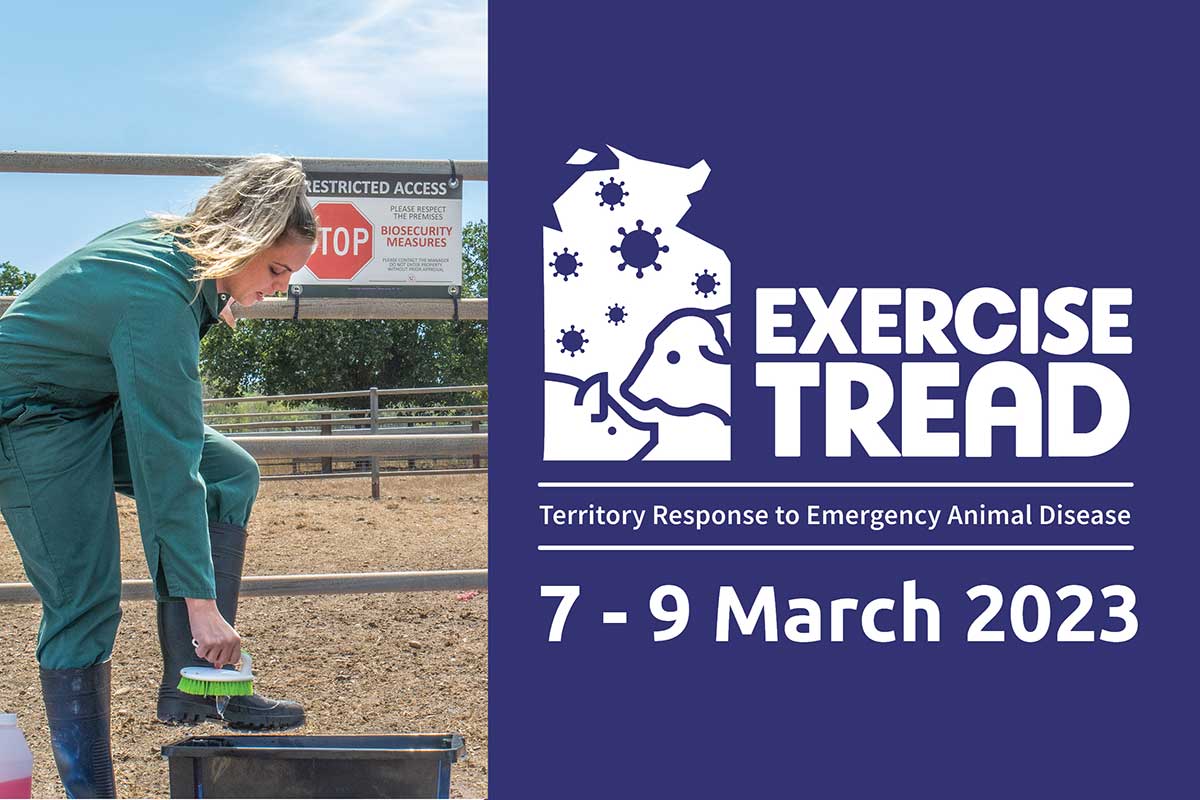
The biggest emergency biosecurity exercise the Territory has ever seen is set to be held next week.
On 7 to 9 March 2023, the Northern Territory (NT) Department of Industry, Tourism and Trade (DITT) will host Exercise TREAD 3, a functional exercise to practice the Territory’s response arrangements to an emergency animal disease (EAD) detection, based on foot and mouth disease (FMD).
This exercise continues on from discussion exercises (Ex TREAD 1 and 2) which were held late 2022.
Being prepared has never been more important. The impact of just one of the emergency animal diseases which are present in the regions to our north would be catastrophic. As a nation, recovering and being able to re-establish international trade would be reliant on how effectively we undertake surveillance and preparedness and emergency response.
The exercise will be conducted in the NT Emergency Operations Centre at Peter McAulay Centre with a number of field exercises planned. This is subject to the centre being available due to current weather related emergency operations. Staff from across NT Government and industry have been appointed to perform exercise roles similar to those they would in a real scenario, which will require them to apply all of their knowledge and skills to respond to the disease.
The scenario starts with the verification by the Australian Centre for Disease Preparedness of a positive case of FMD and the escalation of the response from DITT to a whole of NT Government. Scenario development will be managed by an Exercise Control Team who are coordinating the exercise.
The aim is to have well practiced NT emergency arrangements in response to an emergency animal disease incident in the NT as described in the Territory response to emergency animal disease plan. The outcomes include development of fit for purpose response plans; standard operating procedures and a shared understanding of the response arrangement to a significant EAD in the NT.
The exercise follows other activities held recently in the Territory, including an Emergency Animal Disease Awareness Webinar, and two workshops in Darwin and Alice Springs aiming to give livestock and allied industries the opportunity to increase awareness of our EAD response.
Date study trip
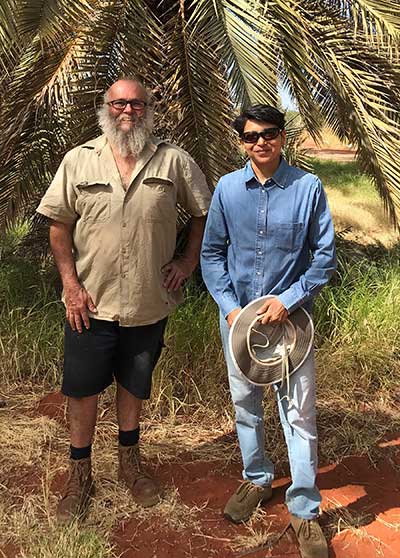
Caption: Kim Mackay, Manager of Desert Fruit Company, near Alice Springs and on the right is our staffer Girija Page, Senior Research Horticulturist.
A Northern Territory (NT) research horticulturist is one of 3 participants from Australia selected for an international date industry capacity building tour of 4 countries this year.
Dr Girija Page, a senior research horticulturist from the Arid Zone Research Institute (AZRI) in Alice Springs, will be visiting India, the United Arab Emirates, Jordan and Israel, this month.
Supported by AgriFutures Australia and the Australian Date Growers Association (ADGA), the tour is an opportunity for exchanging knowledge and learning about date production and supply systems from some of the best facilities in the date industry.
The visit will include various date farms, research and production facilities that can help advance date production and supply systems in Australia, and in particular the NT.
Date farming is an existing and emerging industry and research work is underway at AZRI in collaboration with date growers to support the date industry in the NT.
Capacity building in date production and supply chains is critical to take the existing and emerging date industry forward in the Territory.
Advancing NT date production and supply chain systems to become a more profitable and sustainable enterprise, will offer the Territory more opportunities for international market expansion.
This tour will add value by supporting the Australian date growers to address key industry challenges.
The Department of Industry, Tourism and Trade has strong working relationships with ADGA. Dr Girija Page is a research horticulturist with AZRI, with a background in agriculture and horticulture. Dr Page and colleagues at AZRI are exploring the commercial potential of many other horticultural crops for the NT.
Research on date growing helps inform farmers about the best varieties to grow to suit the climate and conditions, and also offers support on key industry challenges.
In the last few years Dr Page has contributed to furthering the discussion on environmental sustainability of horticultural systems and led capacity building activities for sustainable and profitable farming.
Inaugural CEO for new Cattle Australia
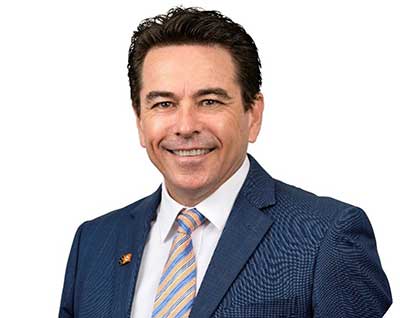
The Department of Industry, Tourism and Trade’s Deputy Chief Executive Luke Bowen has announced he is moving to a new role, and returning to his industry roots, as the inaugural CEO for a new national cattle body, Cattle Australia.
Luke brings to Cattle Australia, a broad and extensive wealth of knowledge in, the cattle industry, advocacy processes, grant funding, program management and membership-based organisations.
The formation of Cattle Australia follows many years of work by industry to restructure to a single representative body for the nation’s single largest agricultural sector.
Luke has been overseeing Agriculture, Fisheries and Biosecurity for the past 2 years, after originally joining the Department of the Chief Minister to lead the Northern Australia Development Office in 2014.
Throughout his career, Luke has remained a strong advocate for Northern Australian and industry development.
As in interim measure our current Senior Director of Fisheries Ian Curnow will act in Luke’s role following his last day on 3 March 2023.
This is an important role to government and Ian is very well placed to take the reins from Luke as we undertake recruitment nationally for the ongoing position.
The department and most especially the Agriculture, Fisheries and Biosecurity teams are sad to see Luke go and have appreciated his leadership and unrelenting passion for the work we do. He will be missed!
Read more on the Cattle Australia website.
Meet the Australian chief environmental biosecurity officer

Dr Robyn Cleland, Australia’s former Chief Environmental Biosecurity Officer (CEBO) officially retired on 30 December 2022 after 22 years in the Australian Public Service.
Dr Bertie Hennecke has been appointed as the new CEBO and commenced in the role.
Dr Hennecke joined the Department of Agriculture, Fisheries and Forestry in 2010. Before being appointed as CEBO, he held senior leadership roles in the Australian Bureau of Agricultural and Resource Economics and Sciences (ABARES) and in several of the department’s plant biosecurity areas.
Dr Hennecke was responsible for biosecurity, forestry and fisheries in ABARES, as well as overseeing ABARES work in coordination, production and dissemination of spatial land use data. In plant health policy he led the design, progress and delivery of Commonwealth, national and international policies and programs that improved the protection and maintenance of Australia’s plant health status, and facilitated safe trade. Dr Hennecke continues to have responsibility for the Australian Plague Locust Commission.
Dr Hennecke’s background is in natural resource management, invasive species, and agricultural sciences with nearly 30 years’ experience in the public service and academia in Australia. He holds a PhD in Botany and a Master’s degree in International Agriculture.
We thank Dr Cleland for her significant contributions to environmental biosecurity in her time as CEBO and wish her all the very best in her retirement, and welcome Dr Hennecke to the role.
The office of the Chief Environmental Biosecurity Officer can continue to be contacted at acebo@agriculture.gov.au.
Attracting more workers to the Territory
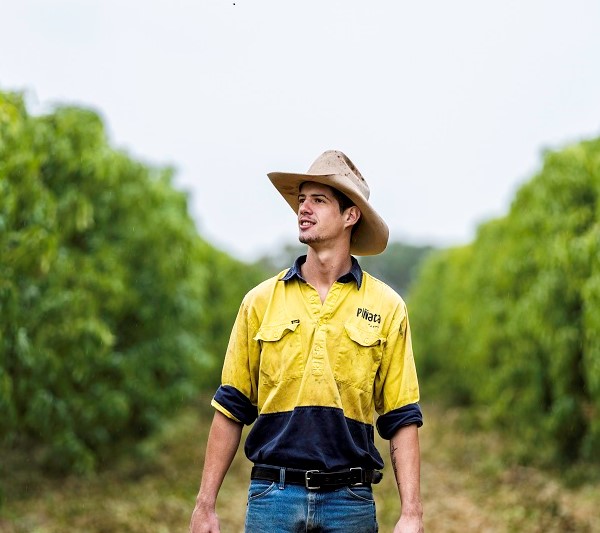
The next phase of the Global Worker Attraction program is underway with the Territory Government leading a worker attraction delegation to the United Kingdom and Ireland this month.
This next phase includes a targeted marketing campaign and in country information sessions targeting workers to move to the Territory.
The information sessions are designed to connect employers with workers and give job seekers all the information they need to succeed in the Territory job market.
This is the perfect time for skilled migrants to consider a move to Australia’s Northern Territory and make the most of the abundance of opportunities we have here.
Find out more about the Territory on The Territory website.
Dili to Darwin, ties strengthened with Timor-Leste
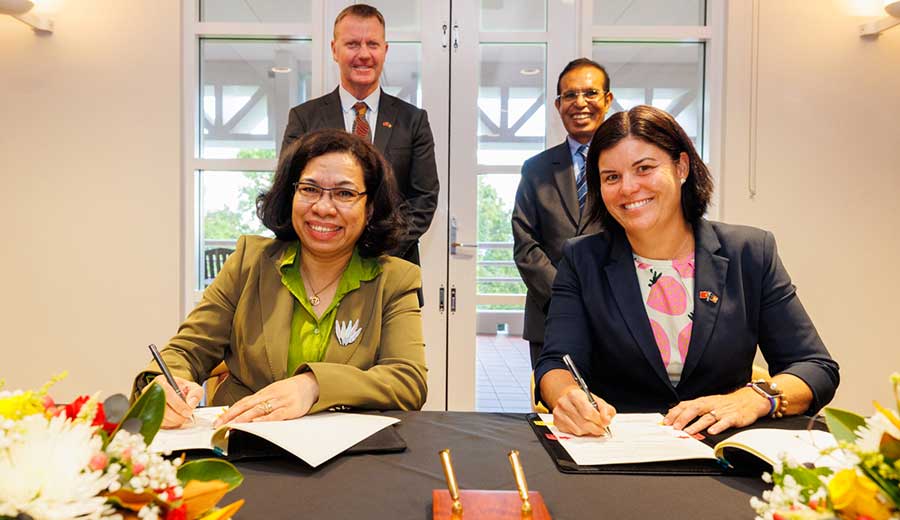
The Northern Territory is further strengthening ties with Timor-Leste with the signing of a 4-year strategic partnership agreement, boosting business and trade opportunities between our jurisdictions.
Timor-Leste is identified as a priority country in the Northern Territory international engagement strategy.
The Northern Territory aims to be the destination of choice for Timorese workers under the Commonwealth’s PALM scheme. Skills learnt on farm can be used when workers return home.
The strategy outlines the Territory Government’s plan to be the preferred partner for business, in an intensely competitive and rapidly evolving global market.
It also supports an increased focus on trade and investment in the agriculture sector.
The strategic partnership agreement 2023-2027 builds on the previous agreement and reinforces the strong relationship between Timor-Leste and the Northern Territory.
This agreement implements a new strategic framework for bilateral cooperation between the Timor-Leste Government and the Northern Territory Government, and will also complement the Australian Government’s aid program.
In 2022, the value of exports to Timor-Leste from the Northern Territory was $16 million, and I look forward to this growing in the future.
The Northern Territory is the only Australian jurisdiction with a strategic partnership agreement with Timor-Leste, which highlights the importance of our relationship.
Give feedback about this page.
Share this page:
URL copied!
